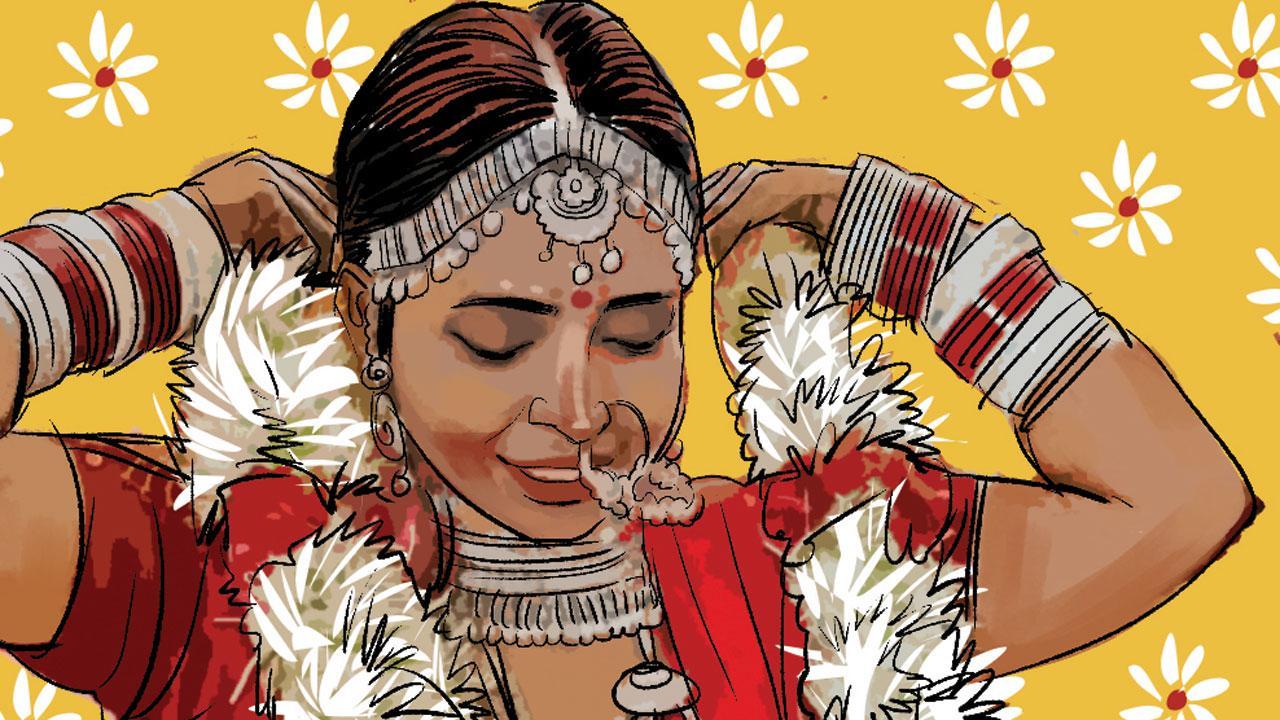From self-love to self-marriage, yaniki sologamy, which 24-year-old Kshama Bindu performed last week, seems a logical journey

Illustration/Uday Mohite
![]() With a shiny, “main apni favourite hoon”, Kareena Kapoor in Jab We Met, prefigured the social media era of self-love and its limited feminisms. I am conflicted about self-love. A part of me is impatient with its pick-me, don’t-hurt-me air. The nicer me recognises a cry for help in the face of social constrictions and demands. The nicer me rarely convinces the impatient me. If one wants to lead a life as a feminist adventurer, then “it’s complicated” seems the sexier, more accurate relationship status with self.
With a shiny, “main apni favourite hoon”, Kareena Kapoor in Jab We Met, prefigured the social media era of self-love and its limited feminisms. I am conflicted about self-love. A part of me is impatient with its pick-me, don’t-hurt-me air. The nicer me recognises a cry for help in the face of social constrictions and demands. The nicer me rarely convinces the impatient me. If one wants to lead a life as a feminist adventurer, then “it’s complicated” seems the sexier, more accurate relationship status with self.
ADVERTISEMENT
From self-love to self-marriage, yaniki sologamy, which 24-year-old Kshama Bindu performed last week, seems a logical journey. From self-marriage to self-congratulation? That is certainly the easy journey social media provides through a low-bar low-stakes feminism—yaniki, people doing things, which may be broadly against social convention, but which they individually are not prevented from doing, like #NoFilter selfies, unwaxed legs or being rude to auntyji—and then claiming bravery for it. Perhaps sologamy is most usefully understood as a kind of performance art—and art has several meanings, if it’s good. I’m curious—what next?
At 12, someone mentioned my inevitable matrimony, and I primly declared—“I don’t believe in the institution of marriage” earning glares from my father. I didn’t quite know what it meant, but perhaps read it in a book whose larger landscape resonated appetisingly. At 27, I decided never to attend a New Year’s Eve party because my friends’ anxiety about being losers without a party invite, felt claustrophobic. I brought in the 21st century in stylish solitude—my first self-made margarita, new lace trimmed pyjamas, fireworks framed by the window of my own place, and the then-considered-dodgy excitement of an online romance. My friend M was shocked when I agreed to go to his party five years later. It hadn’t been about the party, but about shutting out the noise of the world, so I could hear myself think about myself. I had made myself at home with myself and could return to party-love without that pleasure being socially ordained—or even defined by a previous me. At 29, I decided to take a year’s vow of celibacy, seemingly on a whim, but really with a similar impulse—to excavate my own erotic self, amid the platitudes of sexual liberation and
then unexamined templates of polyamory.
Our experiments with love and sex are just ways of finding a way to be ourselves that is not dictated by the world. Some self-love may happen as we reach new levels of critical intimacy with ourselves. An adventurous life, is not meant to be benign, but vital.
The world cottons on to these unlimited quests for freedom and quickly limits them with labels, laws and templates. Today, social media has inserted itself into our private explorations, not allowing us to go deeper into our own meanings too easily—but in fact that journey is never easy. Sologamy isn’t quite a choice, just an evocation of the relationship with self which is already a forever, till death, or reincarnation, do us part, deal. The question of art and politics is: what is that relationship going to be? Mirabai married a king plus a blue god, and used it to fuel a charged body of poetry. Can sologamy free you? That is really up to you, not sologamy.
Paromita Vohra is an award-winning Mumbai-based filmmaker, writer and curator working with fiction and non-fiction. Reach her at paromita.vohra@mid-day.com
 Subscribe today by clicking the link and stay updated with the latest news!" Click here!
Subscribe today by clicking the link and stay updated with the latest news!" Click here!







